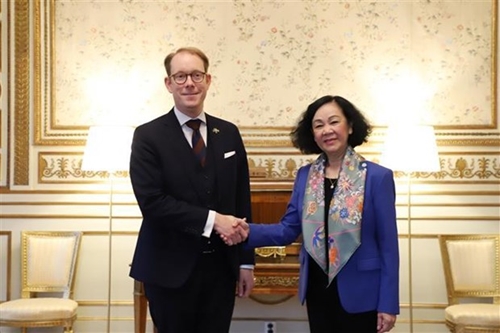During meetings and working sessions with leaders of the Swedish government, parliament and political parties, the Vietnamese official expressed her joy at the fruitful development of bilateral relations.
Mai briefed the hosts on Vietnam’s socio-economic development and international integration achievements after nearly 40 years of renewal, as well as its future goals and development strategies. She thanked Sweden for its support for Vietnam during the country’s struggle for independence and unification in the past and for national construction and development at present.
    |
 |
|
Head of the Communist Party of Vietnam Central Committee’s Organization Commission Truong Thi Mai (right) pays a courtesy visit on Swedish Minister for Foreign Affairs Tobias Billstrom. |
Mai suggested the two sides continue to promote high-level exchanges and cooperation in the Party, State, and people-to-people channels, and advance economic-trade-investment cooperation. She also suggested to strengthen cooperation in fields where Sweden has strengths such as green technology, innovation, clean energy transition, and green energy, thus contributing to stepping up bilateral relations in a practical and effective manner.
She called on the Swedish side to create favorable conditions for the Vietnamese community to live, study and work stably in the North European country.
The Swedish leaders expressed their pleasure at the increasing cooperative relationship between the two countries, affirming that Vietnam is an important partner of Sweden in the Asia-Pacific region. They agreed to expand cooperation between the two countries.
They affirmed that Mai’s visit contributed significantly to deepening bilateral relations.
The Swedish side shared experience in organizing the public administrative apparatus, and anti-corruption measures, as well as efforts to promote the green transition process in the country.
The two sides also discussed international and regional issues of mutual concern, affirming the principle of respecting international law and the U.N. Charter in resolving international disagreements and disputes to ensure peace and security in the world, including the East Sea (South China Sea).
Source: VNA